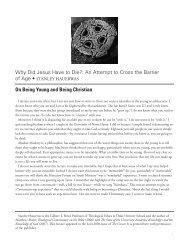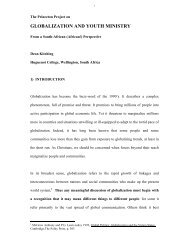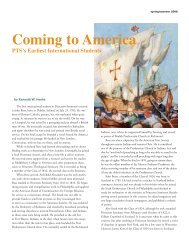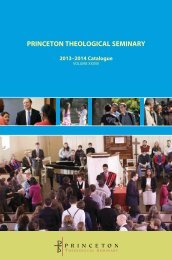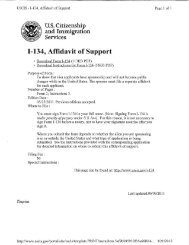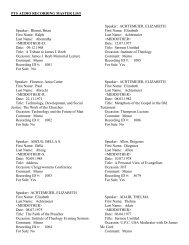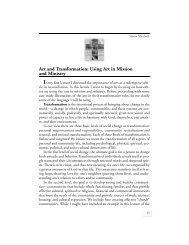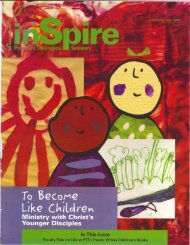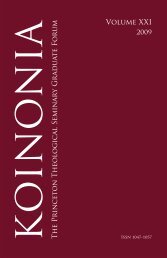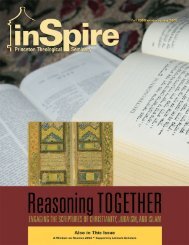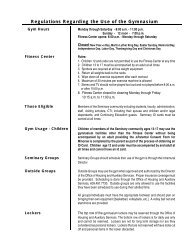P E R S P E C T I VAS - Princeton Theological Seminary
P E R S P E C T I VAS - Princeton Theological Seminary
P E R S P E C T I VAS - Princeton Theological Seminary
Create successful ePaper yourself
Turn your PDF publications into a flip-book with our unique Google optimized e-Paper software.
Perspectivas/Occasional Papers • Fall 2006Perspectivas/Occasional Papers • Fall 2006You shall not charge interest on loans to anotherIsraelite… On loans to a foreigner you may chargeinterest…(Deut. 23:19, 20).But if you will not obey the Lord your God by diligentlyobserving all his commandments and decrees…then all these curses shall come upon you and overtakeyou… Aliens residing among you shall ascend aboveyou higher and higher, while you shall descend lowerand lower. They shall lend to you but you shall notlend to them; they shall be the head and you shall bethe tail (Deut. 28:15, 43-44).In attempting to retrieve critically these biblical materials, weneed to recognize the ambiguities that we recognize in the texts inlight of our contemporary values and expectations for social justice.The welfare system advanced in these texts implies theacceptance of resident aliens in their status as minority, subordinateand vulnerable groups within the social hierarchies in theIsraelite society. The God of the Deuteronomist is also a god whopromotes the conquering of territories, the destitutions of indigenouspopulations, the genocide of native peoples, the discriminationof foreigners, and allows the subordinate and dependentstatus of resident aliens.THIRD THESISWhen critically studied, Scriptures provide religious and ethicalinsights to inform and support a theological and pastoralagenda that supports the struggles and aspirations for justice andhuman rights of immigrant workers around the world and in theU.S.A. The critical interpretation of these biblical traditions for ustoday re q u i res the elaboration of some hermeneutical principles.1. Our reading strategies of biblical texts that represent dynamics32of migration require that we explore them with attention to ourbest understanding of the complex economic, socio-politicaland cultural factors and situations that precipitate and sustainmigration flows and networks, among others: a) systems ofsending and receiving societies, b) imperial and colonialdynamics, c) the emergence of immigrant communities, d) thedevelopment of multicultural societies, e) relations betweenand among majority and minority groups, f) the dynamics andpolitics of national and diasporic groups, g) the variety ofnationalist, diasporic and cosmopolitan agendas with differentethnocentric and ethnorelativist ideologies, h) the practice ofracialization and racism, i) the practices and ideologies of socialhierarchies (class, gender, ethnic, racial, generational, etc.) thataffect citizens and denizens, j) the emergence of reform andsocial movements in multicultural situations, k) the dynamicsand changes in migrant religious communities.2. The interpretation of biblical texts that refer to dynamics ofmigration requires that we become aware of their religious,sociological and political functions. These texts may: a) givereligious, moral and political meaning to historical events; b)provide religious, moral and political sanctions to social practicesand institutions; c) establish or legitimize social and powerrelationships in and between majority and minority groups; d)construct group or national identities in encounters with foreignersin asymmetrical power relationships; e) develop religiousand political agendas or projects; f) engage in ideologicalcritique of other religious-political interpretations and projectsinside and outside Israel.3. The retrieval of biblical texts to reflect and respond theologically,ethically and pastorally to the challenges of migrationprocesses today requires the practice of a political hermeneutics.We need to recognize, first, the differences and commonalitiesof our historical contexts of migration; second, the33




